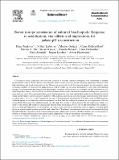Files in this item
Boron isotope systematics of cultured brachiopods : Response to acidification, vital effects and implications for palaeo-pH reconstruction
Item metadata
| dc.contributor.author | Jurikova, Hana | |
| dc.contributor.author | Liebetrau, Volker | |
| dc.contributor.author | Gutjahr, Marcus | |
| dc.contributor.author | Rollion-Bard, Claire | |
| dc.contributor.author | Hu, Marian Y. | |
| dc.contributor.author | Krause, Stefan | |
| dc.contributor.author | Henkel, Daniela | |
| dc.contributor.author | Hiebenthal, Claas | |
| dc.contributor.author | Schmidt, Mark | |
| dc.contributor.author | Laudien, Jürgen | |
| dc.contributor.author | Eisenhauer, Anton | |
| dc.date.accessioned | 2020-07-14T09:30:02Z | |
| dc.date.available | 2020-07-14T09:30:02Z | |
| dc.date.issued | 2019-03-01 | |
| dc.identifier | 269138282 | |
| dc.identifier | d980e0ce-dd47-4a2d-8fcb-3178d054eb6b | |
| dc.identifier | 85060584005 | |
| dc.identifier.citation | Jurikova , H , Liebetrau , V , Gutjahr , M , Rollion-Bard , C , Hu , M Y , Krause , S , Henkel , D , Hiebenthal , C , Schmidt , M , Laudien , J & Eisenhauer , A 2019 , ' Boron isotope systematics of cultured brachiopods : Response to acidification, vital effects and implications for palaeo-pH reconstruction ' , Geochimica et Cosmochimica Acta , vol. 248 , pp. 370-386 . https://doi.org/10.1016/j.gca.2019.01.015 | en |
| dc.identifier.issn | 0016-7037 | |
| dc.identifier.uri | https://hdl.handle.net/10023/20243 | |
| dc.description | This project has received funding from the European Union’s Horizon 2020 research and innovation programme under the Marie Sklodowska-Curie grant agreement No. 643084 (BASE-LiNE Earth), and was also supported by the collaborative research initiative CHARON (DFG Forschergruppe 1644- Phase II) funded by the German Research Foundation (DFG). | en |
| dc.description.abstract | CO 2 -induced ocean acidification and associated decrease of seawater carbonate saturation state contributed to multiple environmental crises in Earth's history, and currently poses a major threat for marine calcifying organisms. Owing to their high abundance and good preservation in the Phanerozoic geological record, brachiopods present an advantageous taxon of marine calcifiers for palaeo-proxy applications as well as studies on biological mechanism to cope with environmental change. To investigate the geochemical and physiological responses of brachiopods to prolonged low-pH conditions we cultured Magellania venosa, Terebratella dorsata and Pajaudina atlantica under controlled experimental settings over a period of more than two years. Our experiments demonstrate that brachiopods form their calcite shells under strong biological control, which enables them to survive and grow under low-pH conditions and even in seawater strongly undersaturated with respect to calcite (pH = 7.35, Ω cal = 0.6). Using boron isotope (δ 11 B) systematics including MC-ICP-MS as well as SIMS analyses, validated against in vivo microelectrode measurements, we show that this resilience is achieved by strict regulation of the calcifying fluid pH between the epithelial mantle and the shell. We provide a culture-based δ 11 B−pH calibration, which as a result of the internal pH regulatory mechanisms deviates from the inorganic borate ion to pH relationship, but confirms a clear yet subtle pH dependency for brachiopods. At a micro-scale level, the incorporation of boron appears to be principally driven by a physiological gradient across the shell, where the δ 11 B values of the innermost calcite record the internal calcifying fluid pH while the composition of the outermost layers is also influenced by seawater pH. These findings are of consequence to studies on biomineralisation processes, physiological adaptations as well as past climate reconstructions. | |
| dc.format.extent | 17 | |
| dc.format.extent | 2327467 | |
| dc.language.iso | eng | |
| dc.relation.ispartof | Geochimica et Cosmochimica Acta | en |
| dc.subject | Biomineralisation | en |
| dc.subject | Boron isotopic composition | en |
| dc.subject | Culturing experiment | en |
| dc.subject | Low-magnesium calcite | en |
| dc.subject | pH and pCO reconstruction | en |
| dc.subject | Physiological response | en |
| dc.subject | Proxy calibration | en |
| dc.subject | GE Environmental Sciences | en |
| dc.subject | Geochemistry and Petrology | en |
| dc.subject | DAS | en |
| dc.subject | SDG 13 - Climate Action | en |
| dc.subject | SDG 14 - Life Below Water | en |
| dc.subject.lcc | GE | en |
| dc.title | Boron isotope systematics of cultured brachiopods : Response to acidification, vital effects and implications for palaeo-pH reconstruction | en |
| dc.type | Journal article | en |
| dc.contributor.institution | University of St Andrews. School of Earth & Environmental Sciences | en |
| dc.identifier.doi | https://doi.org/10.1016/j.gca.2019.01.015 | |
| dc.description.status | Peer reviewed | en |
This item appears in the following Collection(s)
Items in the St Andrews Research Repository are protected by copyright, with all rights reserved, unless otherwise indicated.

